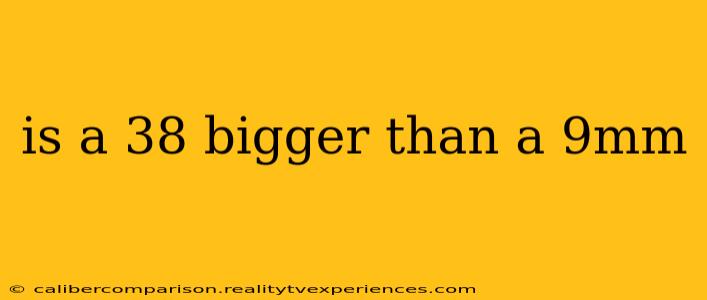Is a .38 Bigger Than a 9mm? Understanding Caliber Differences
The question of whether a .38 caliber is bigger than a 9mm is a common one, particularly for those new to firearms. The answer isn't simply yes or no, as it depends on what aspect of the cartridge you're comparing. Let's delve into the specifics to clarify the differences.
Comparing Diameter: A Key Difference
The most straightforward comparison involves the bullet diameter. While both are commonly referred to as handgun calibers, their diameters differ slightly:
-
9mm: The 9mm Parabellum (also known as 9x19mm) has a bullet diameter of approximately 9.02 millimeters (0.355 inches).
-
.38 Special: The .38 Special has a bullet diameter of approximately 0.357 inches (9.07 mm).
Therefore, in terms of bullet diameter, the .38 Special is slightly larger than the 9mm. This difference is minor, but it's important to note.
Beyond Diameter: Case Length and Powder Capacity
The difference extends beyond just bullet diameter. The cartridge case—the metal housing holding the gunpowder and primer—also varies in size. The .38 Special cartridge case is longer than the 9mm Parabellum case. This results in:
-
Greater Powder Capacity (typically): The longer case of the .38 Special generally allows for a larger powder charge, leading to potentially higher bullet velocities and energy in some loads. However, modern 9mm ammunition often matches or exceeds the energy of older .38 Special loads.
-
Different Weaponry: The differing dimensions mean that a 9mm firearm cannot fire .38 Special ammunition, and vice versa. The cartridges are not interchangeable.
.38 vs. 9mm: Performance Considerations
While the diameter difference is subtle, the variations in powder capacity and resulting performance characteristics are more significant. Modern 9mm ammunition frequently exhibits higher velocity and muzzle energy compared to older .38 Special rounds. However, the energy delivered also depends on the specific ammunition used— factors such as bullet weight, construction (hollow point, full metal jacket, etc.), and powder load drastically affect performance.
Choosing between a 9mm and a .38 Special often comes down to personal preference, availability, intended use (self-defense, target shooting, etc.), and the specific firearm model. Both calibers have a rich history and remain popular choices for handgun enthusiasts and law enforcement.
Conclusion
In summary, while the .38 Special's bullet diameter is slightly larger than the 9mm's, a complete comparison requires considering cartridge case length, powder capacity, and the resulting performance differences in different loads. The best caliber for a specific application depends on various factors and personal preference. This detailed analysis provides a clearer understanding of the nuances between these two commonly used handgun calibers.

